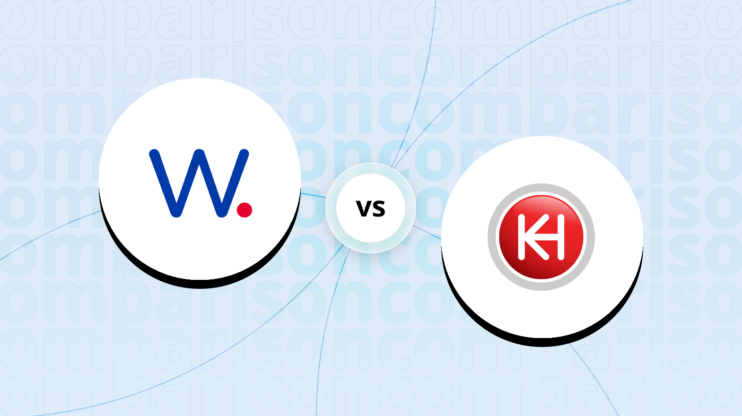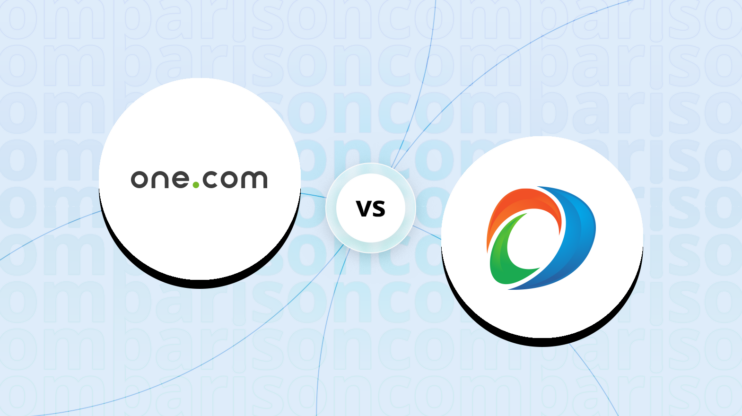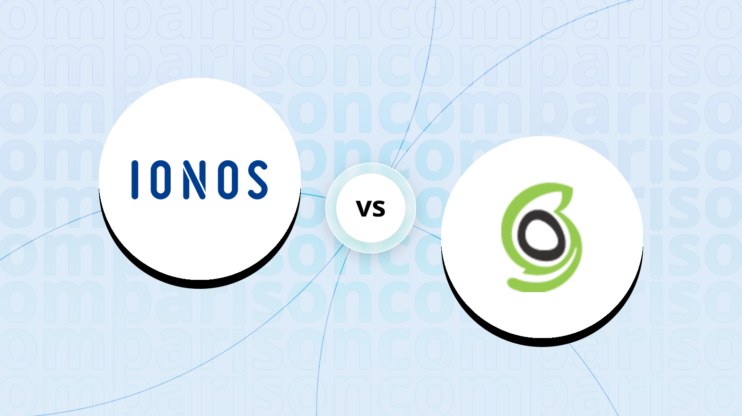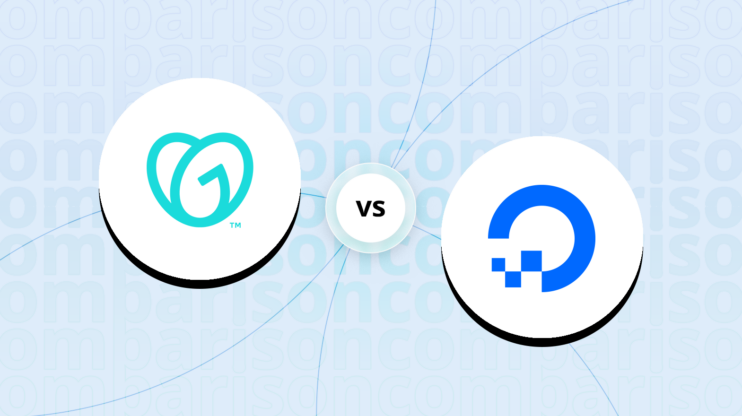Namecheap vs Web Hosting Hub: Final verdict
Looking over Namecheap vs. Web Hosting Hub, both provide a comprehensive range of hosting services but differ in their strengths and weaknesses.
-
Web Hosting Hub (Overall grade: 7.5)
is a solid choice for many users, offering competitive pricing and strong uptime. It excels in customer support, providing 24/7 access through various channels, including phone support, which is particularly beneficial for those who prefer verbal assistance. Web Hosting Hub also integrates BoldGrid as a drag-and-drop website builder, making it an appealing option for users looking for extensive customization options. However, it lacks advanced scalability options like VPS and dedicated hosting, which may limit its suitability for high-traffic websites or those with extensive resource needs.
Namecheap (Overall grade: 7.2)
stands out for its variety of hosting plans, including shared, cloud, VPS, and dedicated hosting, making it versatile for different user requirements. Its performance is bolstered by SSD storage and features such as free CDN and SSL, contributing to faster load times and improved security. Namecheap’s support for a wide range of SSL certificates and detailed GDPR and PCI compliance features further enhance its appeal. However, some users report slower than average response times and occasional downtimes. Despite these issues, Namecheap remains a strong contender due to its affordability, extensive feature set, and reliable service quality.
 Overall grade:7.2 |
 Overall grade:7.5 |
|
|---|---|---|
| Uptime and Availability | 8.0 | 9.2 |
| Hosting Performance | 8.2 | 5.0 |
| Hosting Security | 8.5 | 8.0 |
| Price | 8.7 | 7.6 |
| Hosting Features | 7.5 | 6.9 |
| Ease Of Setup | 8.8 | 8.8 |
| User Management | 0.0 | 7.1 |
| Customer Support | 8.0 | 7.8 |
| User feedback | 4.3/5 | 4.5/5 |
Hosting types offered
Both platforms provide a variety of hosting types, each designed to meet the different needs of users.
 |
 |
|
|---|---|---|
| Shared hosting | ||
| Cloud hosting | ||
| WordPress hosting | ||
| Ecommerce hosting | ||
| VPS hosting | ||
| Dedicated hosting |
Although both offer a variety of hosting plans tailored to different needs, in
certain cases, one platform may prove to be more suitable.
Detailed comparison
Uptime and availability
Evaluates the average uptime statistics, uptime guarantee and overall availability of the hosting
provider
Score Components:
- Uptime percentage (30%): evaluates the uptime statistics in given period of time
- Uptime guarantee (20%): Assesses if the platform offers an uptime guarantee and
whether the actual uptime matches the promised guarantee. - General performance (25%): Evaluates how fast is the average response time and overall
it’s stability. - Responsiveness (10%): Adaptability to different devices and screen sizes.
- Availability (25%): Reflects the total downtime and number of outages.
 8.0
8.0
 9.2
9.2
🏆 Winner Web Hosting Hub: A solid option offering competitive pricing and strong uptime.

Namecheap provides excellent uptime guarantees, with shared, business, and dedicated servers promising 100% uptime and other hosting types offering 99.9%. Despite these guarantees, actual performance has varied, with some tests showing a perfect 100% and others reflecting slight downtimes. Namecheap’s response times are generally slower than industry averages, but customers may receive up to a month of free hosting in case of downtime.

Web Hosting Hub focuses on speed and uptime, featuring free SSDs and SSL to enhance website performance. Various plans offer different performance levels, from standard to 4X, ensuring flexibility for all users. Additional features like free domain, website transfer, and 24/7 support, combined with a comprehensive 90-day money-back guarantee, make it a standout choice for many users.
Which one has better hosting performance?
Score Components:
- Hosting speed (30%): This includes SSD quality, Load times, PageSpeed score ranges,
additional information on website speed, built-in plugins for performance enhancement, available caching
methods, and CPU/RAM options - CDN (20%): Considers whether CDN is available or not, whether it’s free or paid, and
the quality of the CDN service - Available data centers (30%): Evaluates the number of data centers and their locations
globally. - Scalibility (20%): Looks at whether elastic scaling is available, the process required
to scale (manual upgrade vs. automatic scaling), the presence of dedicated servers, and the costs
associated with scaling.
 8.2
8.2
 5.0
5.0
🏆 Winner Namecheap: Great performance across multiple hosting plans.
When it comes to general performance, Namecheap stands out. They offer SSD storage across all plans, contributing to faster load times and improved PageSpeed scores. Their shared hosting and WordPress hosting both include unmetered bandwidth and 99.9% uptime. Namecheap also provides a free CDN with their WordPress hosting plans, enhancing website loading speed globally. They have data centers located in the US, UK, and the EU, with options for cloud storage. Web Hosting Hub offers unlimited storage and bandwidth as well, with their SSDs claimed to be 20 times faster, but they don’t mention specific load times or provide a CDN service.
Website Speed
Website speed is crucial for any hosting service, and Namecheap has an edge here. Their WordPress hosting plans boast a fully loaded time of 0.7 seconds and a time to first byte of 192 milliseconds. This is complemented by a free CDN and free SSL, which contribute to faster and more secure browsing experiences. Web Hosting Hub, while offering standard, 2X, and 4X speed options, doesn’t provide detailed metrics on load times. Their maximum I/O speed reaches 2Mb/s in the Dynamo plan, which is slower compared to the 3x faster performance of Namecheap’s hosting.
Scalability
Scalability is another area where Namecheap excels. With plans across shared, WordPress, reseller, and VPS hosting, you can swiftly upgrade resources. The VPS hosting plans allow for considerable scaling with up to 8 cores and 12288 MB RAM. Scaling in Namecheap involves moving between plans, but it’s straightforward and the costs are transparent. Web Hosting Hub also offers scalable plans, but the specifics on dedicated servers or automatic scaling are not detailed. Both providers allow for upgrading plans; however, the exact cost and complexity of scaling in Web Hosting Hub remain unclear.
Which one has better security features?
and regulatory requirements
Score Components:
- Technical security measures (40%): This includes encryption, firewalls, DDoS
protection, secure configurations, server monitoring, access control and availability of security addons
(e.g Sitelock security). - Operational security measures (30%): Encompasses data privacy, backups and data
redundancy. - Compliance and certifications (20%): Adherence to legal and regulatory requirements
(e.g., GDPR, HIPAA) and possession of certifications (e.g., ISO 27001, SOC 2). - Business and reliability (10%): Factors in the provider’s reputation, uptime
guarantees, and customer support.
 8.5
8.5
 8.0
8.0
🏆 Winner Namecheap: Namecheap provides a robust suite of security features catering to diverse user needs with strong SSL options and extensive PHP support.
Technical security measures:
Namecheap offers a wide range of SSL certificates, including Domain Validation (DV), Organization Validation (OV), and Extended Validation (EV) types, providing options for single domains, wildcards, and multiple domains. In contrast, Web Hosting Hub primarily provides a free SSL and supports third-party SSLs. Namecheap supports PHP versions from 5.X to 8.X, offering more versatility, whereas Web Hosting Hub supports only PHP 7. Both web hosts have features like IP blocking and Hotlink Protection; however, Namecheap additionally offers SPF and Domain Keys for email authentication and PGP/GPG for email encryption.
Operational security measures:
Both providers offer 24/7 live support, but Namecheap also provides dedicated Jellyfish Spam Protection, BoxTrapper for spam mitigation, and Leech Protect for login protection. Additionally, Namecheap’s PremiumDNS offers robust, secure DNS service globally. Web Hosting Hub features Advanced Policy Firewall Protection, suPHP encryption to ensure scripts run securely, and Password Protected Directories. Namecheap’s operational measures include Two-Factor Authentication (2FA) and a Virus Scanner, lending it an added edge.
Compliance and certifications:
Namecheap explicitly provides user rights under GDPR, including access, rectification, portability, and deletion requests. It emphasizes data protection with tools like FastVPN and domain privacy. Web Hosting Hub emphasizes data security and privacy but does not specifically mention GDPR or PCI compliance, unlike Namecheap, which offers detailed GDPR compliance features and alludes to PCI compliance through its security capabilities.
 |
 |
|
|---|---|---|
SSL certificate |
Comprehensive SSL options including DV, OV, EV |
Free SSL and support for third-party SSLs |
Additional security features |
PremiumDNS, FastVPN, Jellyfish Spam Protection, BoxTrapper |
Advanced Policy Firewall Protection, suPHP, Password Protected Directories |
PHP versions |
PHP 5.X to 8.X |
PHP 7 |
GDPR compliance |
Fully detailed |
Not specified |
HIPAA compliance |
Not specified |
Not specified |
PCI compliance |
Not specified but implied |
Not specified |
Hosting features
Score Components:
- Domains (20%): Assesses the availability of a free domain, domain purchase options, and
pricing - Email (15%): Considers if the provider offers full email hosting, or is reselling
third-party service, and if the email is only transactional or not - Website builder (15%): Checks if website builder is available, and it’s user
friendliness and overall the level of customization allowed. - Staging environment (20%): Determines if a staging environment is available, allowing
for testing changes before going live. - FTP & SFTP accounts (10%): Evaluates if and how easily users can access FTP and
SFTP accounts - Git and SSH access (20%): Assess whether Git is integrated into the hosting service and
if SSH access is provided
 7.5
7.5
 6.9
6.9
🏆 Winner
Namecheap: An adaptable hosting provider that offers robust features with a highly competitive pricing structure.
Both Namecheap and Web Hosting Hub offer a plethora of features catering to different user needs, but there are notable differences in certain areas. Namecheap provides three shared hosting plans with free SSL certificates and an easy-to-use website builder, making it ideal for those who want a hassle-free setup. Their WordPress hosting options are also competitively priced with additional performance benefits. On the other hand, Web Hosting Hub includes a free domain with all its plans and integrates BoldGrid as a free drag-and-drop website builder, suitable for more extensive customization. Additionally, Web Hosting Hub offers free advertising credits which could be advantageous for those looking to drive traffic to their websites.
When considering domain registration policies, Namecheap offers 50 free PositiveSSL certificates for the first year, while Web Hosting Hub provides a free custom domain or the option to transfer an existing one for free. Namecheap’s plans come with a 30-day money-back guarantee, compared to Web Hosting Hub’s more generous 90-day guarantee. Both providers offer unlimited email accounts for higher-tier plans, but Namecheap’s comprehensive email services, including Jellyfish Spam Protection, give it an edge. The decision comes down to whether a user prioritizes cost-effective yet feature-rich hosting (Namecheap) or extensive customization and marketing advantages (Web Hosting Hub).
 |
 |
|
|---|---|---|
Free domain |
No |
Yes |
Free SSL |
Yes, for the first year |
Yes |
Email hosting |
Yes |
Yes |
Website builder |
Yes |
Yes |
Staging environment |
Yes |
No |
FTP & SFTP accounts |
Yes |
Yes |
Git and SSH access |
Yes |
Yes |
Free backup |
Yes |
No ($1/month) |
Money back guarantee |
30 days |
90 days |
a location.
As a result in rare cases the features mentioned here can differ from the ones you see on their websites.
Both providers support a range of users from beginners to experts with user-friendly website builders and WordPress staging areas. However, in terms of developer tools, both Namecheap and Web Hosting Hub offer robust options including SSH access, support for multiple programming languages, and Git for version control, thus appealing to developers looking for advanced capabilities.
Email services:
Namecheap provides unlimited email accounts for their higher-tier plans, along with a range of tools such as autoresponders and spam protection, which can create efficient email campaigns. Web Hosting Hub also offers unlimited email accounts across all plans, including features such as secure POP3/IMAP email and spam protection. However, Namecheap includes advanced tools like Jellyfish Spam Protection and supports SPF and Domain Keys, offering extra layers of security and efficiency for email communications. Both hosting providers cover essential email services without the reselling of third-party services like Google Workspace.
Price
Score Components:
- Plan value (40%): What each pricing tier offers.
- Transparency and clarity (30%): Clearness of pricing structures.
- Flexibility of plans (20%): Range of options to suit different budgets.
- Hidden costs (10%): Additional expenses not included in the plan.
 8.7
8.7
 7.6
7.6
🏆 Winner Namecheap: This provider offers a great variety of affordable and feature-rich plans.
Evaluating the pricing of plans among various hosting providers can be complex due to their differing pricing and renewal strategies. Additionally, certain plans require annual commitments, which adds to the difficulty of making comparisons. The prices listed are based on monthly commitments; plans requiring annual commitments are indicated. Additionally, although some providers offer identical plans for WordPress and shared hosting, we have created separate tables for each to enhance clarity.
Namecheap offers different types of hosting plans, including Shared, Reseller, Managed WordPress, and Dedicated Server Hosting. The key standout features include free SSL certificates, free website migration, and unlimited email accounts on selected plans. On the other hand, Web Hosting Hub offers simpler plans with a focus on performance, such as free SSD usage and free SSL certificates. Even though the website transfer service is available, it comes with conditions. Namecheap provides more variety and flexibility in their offerings, making it an appealing choice for different types of users.
 |
 |
|---|---|
|
EasyWP Starter $6.88
1 website, 10 GB SSD storage, 50k visitors/month, Free CDN & SSL, backups, SFTP, 99.9% uptime, Namecheap Cloud. Value for price:9.0
|
Spark $11.99
2 websites, Unlimited storage, Unlimited bandwidth, Free SSL & domain, 10 databases, Auto-Installed WordPress. Value for price:8.0
|
|
EasyWP Turbo $12.88
1 website, 50 GB SSD storage, 200k visitors/month, Free CDN & SSL, backups, SFTP, 1.5x more CPU & RAM. Value for price:8.5
|
Nitro $15.49
Unlimited websites, Unlimited storage & bandwidth, Free SSL & domain, Unlimited databases, Auto-Installed WordPress. Value for price:8.1
|
|
EasyWP Supersonic $19.88
1 website, 100 GB SSD storage, 500k visitors/month, Free CDN & SSL, backups, SFTP, 2x more CPU & RAM, 99.99% uptime. Value for price:8.2
|
Dynamo $20.49
Unlimited websites, Unlimited storage & bandwidth, Free SSL & domain, Unlimited databases, Auto-Installed WordPress. Value for price:8.3
|
 |
 |
|---|---|
|
Stellar $4.48
3 websites, 20 GB SSD, Unmetered bandwidth, Free SSL & domain, 30 mailboxes, Supersonic CDN, website migration, money-back. Value for price:8.0
|
Spark $11.99
2 websites, Unlimited storage & bandwidth, Free SSL & domain, 10 databases, performance standard. Value for price:7.8
|
|
Stellar Plus $6.48
Unlimited websites, Unmetered SSD, Free SSL & domain, Unlimited mailboxes, Supersonic CDN, backups, website migration. Value for price:8.2
|
Nitro $15.49
Unlimited websites, Unlimited storage & bandwidth, Free SSL & domain, Unlimited databases, 2X performance. Value for price:8.1
|
|
Stellar Business $9.48
Unlimited websites, 50 GB SSD, Unmetered bandwidth, Free SSL & domain, Unlimited mailboxes, Supersonic CDN, cloud storage, backups, money-back. Value for price:8.5
|
Dynamo $20.49
Unlimited websites, Unlimited storage & bandwidth, Free SSL & domain, Unlimited databases, 4X performance. Value for price:8.3
|
 |
 |
|---|---|
|
Nebula $19.88
25 cPanel accounts, 30 GB SSD, Unmetered bandwidth, Free cPanel/WHM, 30-day money-back. Value for price:8.0
|
N/A |
|
Galaxy Expert $39.88
100 cPanel accounts, 90 GB SSD, Unmetered bandwidth, Free cPanel/WHM, 30-day money-back. Value for price:8.1
|
N/A |
|
Universe Pro $58.88
150 cPanel accounts, 150 GB SSD, Unmetered bandwidth, Free cPanel/WHM, 30-day money-back. Value for price:8.2
|
N/A |
As a result in rare cases the prices displayed here can differ from the ones you see on their websites.
Enterprise plans
For enterprise needs, Namecheap offers dedicated server hosting starting from $44.88/month, which includes full root access, customizable configurations, and 24/7 support. Web Hosting Hub does not offer dedicated hosting, making Namecheap a more comprehensive choice for large-scale operations requiring extensive resources and customization.
Namecheap vs Web Hosting Hub: Ease of setup
platform.
Score Components:
- Site migration (25%): Assesses whether the provider offers tools for site migration,
either automated or manual, and whether these services are free or require a fee. - Admin panel usability (35%): Evaluates the type of admin panel provided, such as the
standard cPanel or a custom solution, focusing on its accessibility and user-friendliness for both
technical and non-technical users. - Setup features (20%): Examines the availability and ease of use of various setup
features, including FTP accounts, file managers, email account setup, PHPMyAdmin, and easy CDN
configuration. - Help center quality (20%): Measures the quality and accessibility of the provider’s
help center resources, including articles and tutorials.
 8.8
8.8
 8.8
8.8
🏆 Winner Namecheap: A user-friendly hosting provider with extensive support options.
Namecheap utilizes a standard cPanel for most of its hosting plans, which offers a familiar interface for both experienced users and beginners. For its EasyWP hosting, Namecheap provides a custom dashboard tailored specifically for WordPress management, eliminating the need to interact with cPanel. This single, customized dashboard makes it straightforward to handle various administrative tasks such as connecting domains, managing backups, and maintaining the website. The streamlined design of this admin panel ensures that even non-technical users can navigate their administrative duties without difficulty.
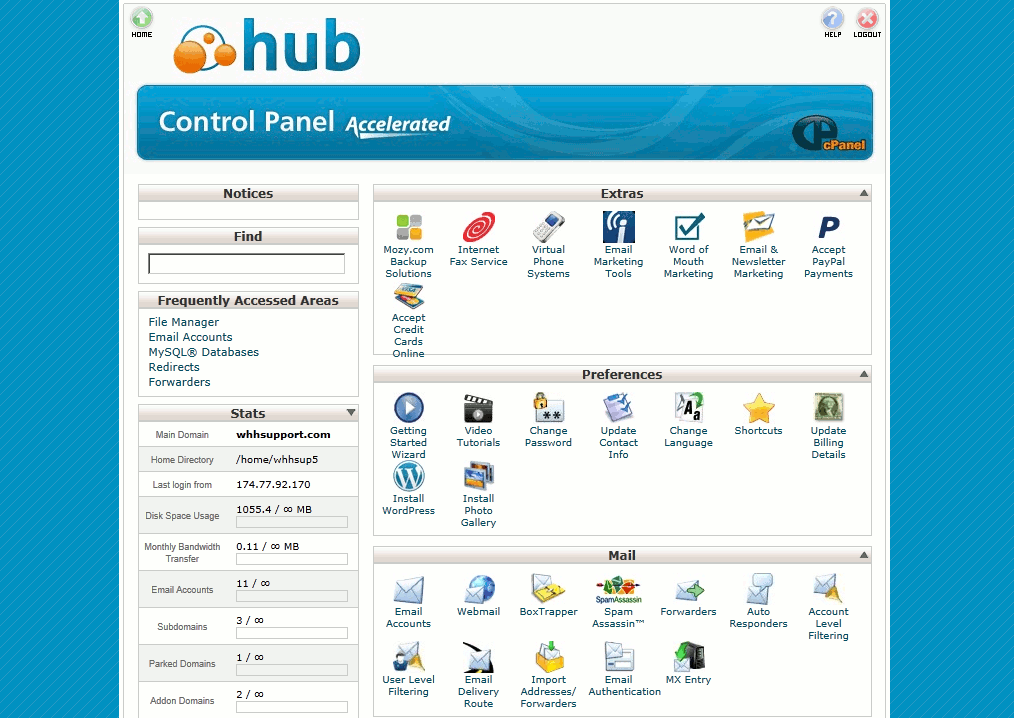
Web Hosting Hub primarily offers a standard cPanel interface, known for being user-friendly and intuitive. In addition to this, they include BoldGrid, a free drag-and-drop website builder that integrates with WordPress for those who prefer a more visual approach to website creation. The Softaculous 1-Click Installer further simplifies the setup process, providing access to over 400 scripts. For users who may not be familiar with traditional cPanel tasks, these additional tools offer a simplified and efficient way to build and maintain their websites.
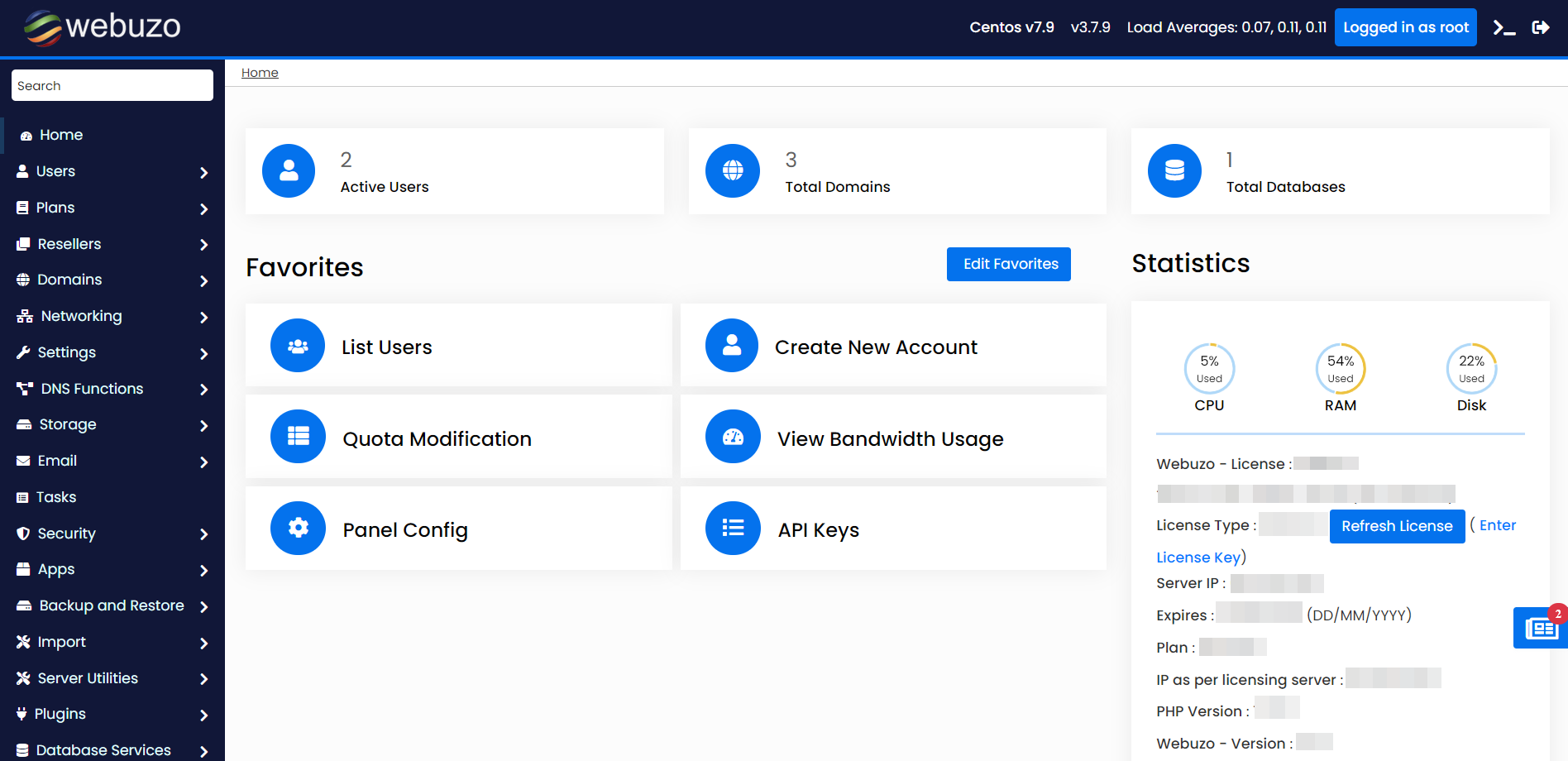
Both Namecheap and Web Hosting Hub offer free migration services, ensuring an easy transition from other hosts. Namecheap uses the All-in-One WP Migration plugin to facilitate site transfers from any web host without additional charges. Similarly, Web Hosting Hub provides free migration services for existing domains, simplifying the process for users. This approach ensures a smooth and hassle-free migration experience and likely contributes to the high satisfaction scores for both providers.
Namecheap’s Help Center is comprehensive, featuring 24/7 live chat, a help desk, and a support ticket system. Their Knowledgebase includes setup guides, troubleshooting tips, and FAQs, making information readily accessible to users. Conversely, Web Hosting Hub offers a Help Center filled with tutorials, a Community Q&A section, tools and resources, and 24/7 live chat and phone support. Both hosting providers ensure that users have multiple avenues to seek help, underscoring their commitment to superior customer support.
User management
accessibility.
Score Components:
- Role customization (40%): Flexibility in creating and defining user roles and
permissions. - Ease of management (30%): User interface and tools for managing users.
- Access control (20%): Effectiveness of access control measures for different user
levels. - Scalability (10%): Ability to manage a growing number of users efficiently.
 0.0
0.0
 7.1
7.1
🏆 Winner
Web Hosting Hub: Ideal for managing multiple user roles with extensive permissions and security measures.
Comparing Namecheap and Web Hosting Hub, Namecheap’s user management features are not detailed, leaving us to speculate about their functionalities. Web Hosting Hub, on the other hand, provides a detailed and structured approach to managing user roles, permissions, and accessibility. The platform enables the creation of email accounts, FTP accounts with varied access levels, and password-protected directories. This flexibility facilitates efficient user role management and tailored access permissions.
Web Hosting Hub offers a user-friendly interface through cPanel, which integrates various tools for seamless user management. The unified control panel supports the creation and management of email accounts, FTP accounts, and databases. Web Hosting Hub’s interface is designed to streamline administrative tasks, ensuring users can easily configure and manage different user roles without requiring advanced technical knowledge.
Web Hosting Hub excels in access control measures, providing options like IP blocking, hotlink protection, and SSH access. These features ensure that site access is managed efficiently and securely. The ability to create unlimited email accounts and manage multiple domains is crucial for growing businesses. With its scalable infrastructure, Web Hosting Hub effectively accommodates an increasing number of users, maintaining performance and security.
Web Hosting Hub user roles table:
| Role | Description | Access highlights |
|---|---|---|
| Email Manager | Manages email accounts, forwarding, and spam filters. | Full control over email settings and preferences. |
| FTP User | Accesses files remotely via FTP. | Specific levels of file access as defined by admin users. |
| Database User | Manages databases and user privileges. | Full access to phpMyAdmin for database configuration. |
Customer support
hosting provider.
Score Components:
- Support communication channels (30%): Measures the variety of customer support types
provided (live chat, chatbot, email, phone, etc.) - Availability (20%): Assesses the availability hours for each channel, including 24/7
support options. - Technical support quality (30%): Assesses whether the provider offers comprehensive
technical support, including hardware upgrades (e.g., HDD to SSD), software installations, and web
server configuration changes. - Enterprise support (20%): Checks if there are dedicated or priority support services
for enterprise-level customers.
 8.0
8.0
 7.8
7.8
🏆 Winner
Namecheap: Offers a highly user-friendly customer service experience with extensive resources and user engagement.
 |
 |
|
|---|---|---|
Phone support |
||
Live chat support |
||
Chatbot |
||
Email/ticket support |
||
Enterprise support (dedicated agent, priority support) |
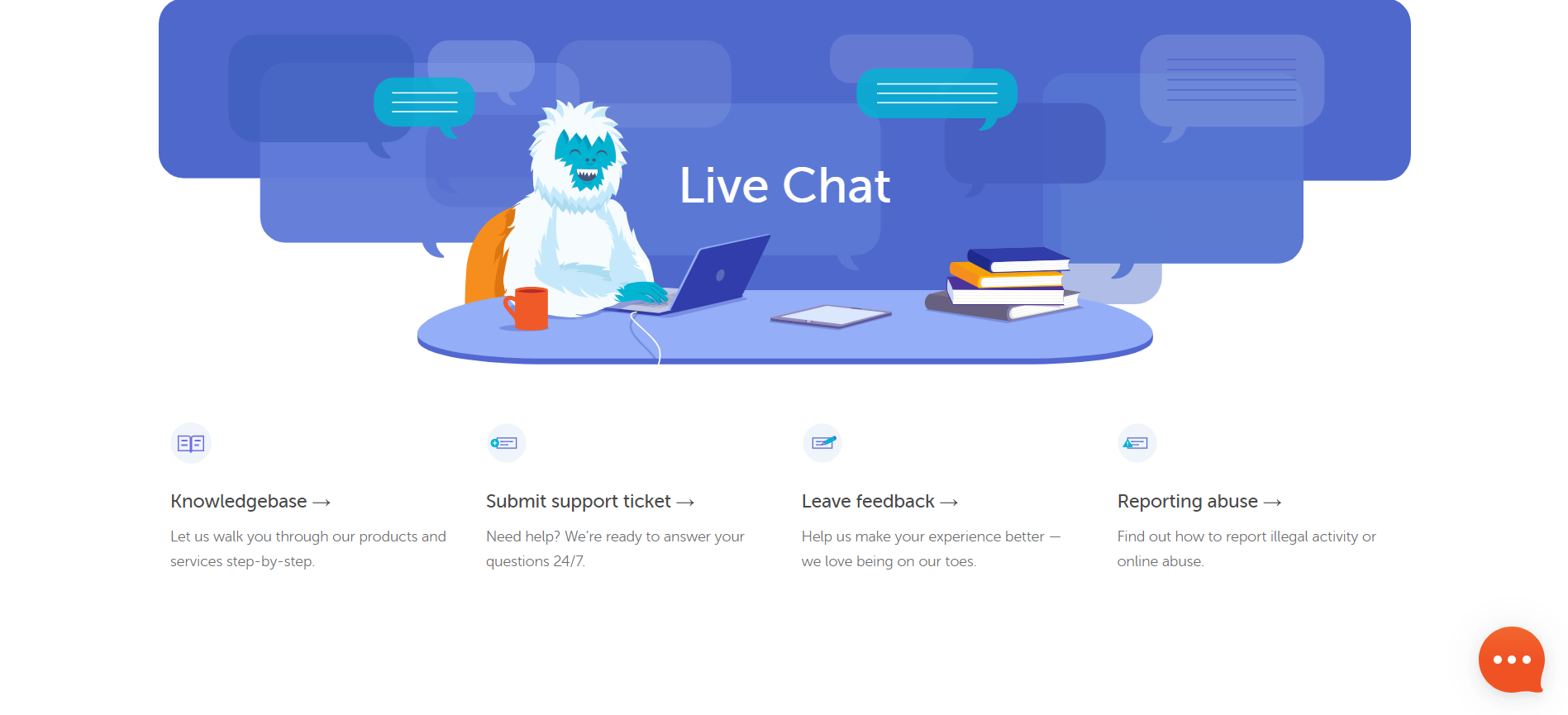
Namecheap and Web Hosting Hub both offer 24/7 customer support, but their services differ in several ways. Namecheap shines with its extensive Knowledge Base and Guru Guides, offering detailed instructions and articles that cover a wide range of topics. Their Live Chat is responsive and generally positive but lacks phone support, which might be a drawback for users who prefer direct voice communication.

On the other hand, Web Hosting Hub offers a more traditional approach with strong telephone support, making it ideal for customers who seek immediate verbal assistance. Their accessible website and 90-day money-back guarantee add value to their service. However, Web Hosting Hub’s support resources, such as a Knowledge Base, are less enriched compared to Namecheap. This makes Namecheap a more resourceful option for users looking for detailed guidance and self-help tutorials.
Namecheap vs Web Hosting Hub: User feedback
Namecheap is widely appreciated for its affordability, reliability, and high-quality customer support. Users commend the availability of free SSL certificates, user-friendly cPanel, and outstanding hosting speed. However, shared hosting speed and the occasional slow response from support are noted concerns. Despite these minor drawbacks, Namecheap remains a popular choice for beginners and small to medium businesses due to its competitive pricing and satisfactory service quality.
Users consistently praise the hosting provider for its easy-to-use interface, robust hosting tools, and extensive features, making it particularly suitable for WordPress implementation. Customer support is often highlighted as responsive and helpful, contributing to an overall positive experience. However, some criticisms include occasional connectivity issues, a somewhat technical and overwhelming interface, and slightly higher costs for certain services like SSL for shared hosting. Despite these minor drawbacks, many users find the service affordable and reliable, offering good value for their needs.
Namecheap vs Web Hosting Hub: FAQ
Which platform is better suited for hosting WordPress websites?
Both Namecheap and Web Hosting Hub offer specialized WordPress hosting with free SSL certificates and easy installations. Namecheap provides competitive pricing and robust features like free CDN and SSD storage, which enhance performance. Web Hosting Hub integrates BoldGrid, a drag-and-drop website builder, for extensive customization. Both platforms are effectively tied, making either a viable option for WordPress hosting.
Which hosting service offers better security features?
Namecheap offers a wide range of SSL certificates including DV, OV, and EV types, along with additional security features like Jellyfish Spam Protection, SPF, and Domain Keys for email authentication. Web Hosting Hub provides free SSL and supports third-party SSLs, alongside Advanced Policy Firewall Protection and suPHP encryption. Namecheap’s extensive security measures and detailed GDPR compliance give it a slight edge in this category.
Which hosting service offers more scalability options for growing websites?
Namecheap excels in scalability with plans that include shared, WordPress, reseller, and VPS hosting, allowing users to upgrade resources as needed. Their VPS hosting plans offer up to 8 cores and 12288 MB RAM for considerable scaling. Web Hosting Hub provides scalable plans but lacks advanced options like VPS and dedicated hosting, making Namecheap better suited for growing websites.
Which service is more suitable for hosting a high-traffic website?
Namecheap is more suitable for hosting high-traffic websites, offering VPS and dedicated hosting options that can handle extensive traffic and resource needs. Their robust infrastructure includes SSD storage and a free CDN, enhancing load times and website performance. Web Hosting Hub does not provide VPS or dedicated hosting, which limits its ability to support high-traffic sites.
What are the major differences in pricing and value between namecheap and webhostinghub?
Namecheap offers a variety of affordable hosting plans, including Shared, Reseller, Managed WordPress, and Dedicated Server Hosting, often with free SSL and website migration services. Web Hosting Hub’s plans are simpler, focusing on performance with features like free SSD usage and SSL certificates. While Web Hosting Hub includes a 90-day money-back guarantee compared to Namecheap’s 30 days, Namecheap provides more value and flexibility in their offerings.
The making of this blog
We followed a clear, step-by-step process to write and research this article.










